From the archives: Joj Mia drama - ‘The real deal'
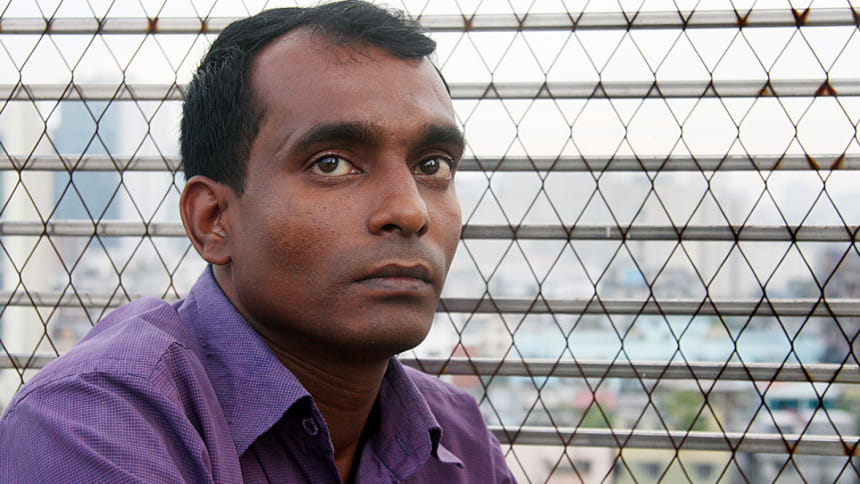
In a mockery to justice, the then ruling BNP-led alliance government in 2004 hurriedly concluded the investigation into the August 21 grenade attack on an Awami League rally at Dhaka's Bangabandhu Avenue, claiming that it was orchestrated by none other than AL men.
Later, the party again claimed that there was actually no political involvement in the attack and picked a hapless Joj Mia from his Senbagh house in Noakhali on June 10, 2005, saying he was responsible for the carnage.
They strongly denied the allegation that the BNP-led government or the party leaders, including Tarique Rahman, had links to that incident.
Later, media exposed that the police were paying Joj Mia's needy family a monthly allowance in exchange of his posing as an attacker.
BNP, however, blasted the media and kept on claiming that Joj Mia was the real deal.
"As investigations are on, I won't name anyone. But I do know for sure that there was a plot, which is still being nursed. The attack was part of a conspiracy to tarnish my government's image," Khaleda tells a party meeting 11 days after the attack on September 2, 2004.
Blame games
On August 21, 2004, assailants hurled grenades at the AL rally on Bangabandhu Avenue where the party chief and then leader of the opposition Sheikh Hasina was delivering speech.
A total of 24 people, mostly AL leaders and workers including late president Zillur Rahman's wife Ivy Rahman, were killed and over 400 others were injured while Hasina narrowly escaped death.
Eleven days after the grenade attack, the then prime minister Khaleda Zia, also chairperson of BNP, held Awami League leaders responsible for the acts.
"As investigations are on, I won't name anyone. But I do know for sure that there was a plot, which is still being nursed. The attack was part of a conspiracy to tarnish my government's image," she told at a party meeting on September 2, 2004.
One month later, several BNP lawmakers in the parliament blamed the AL for carrying out the attack on its own rally, reinforcing Khaleda's claim.
The then foreign minister Morshed Khan said, "We know better who sheds crocodile tears at meetings with foreign envoys and from where the money for treatment comes."
Abul Khaer Bhuiyan, another BNP lawmaker, asked the then state minister for home Lutfozzaman Babar in parliament why AL changed the rally venue.
Babar replied, "It's a good question. The Awami League men have sought permission for Muktangan, but in the afternoon they moved the venue to Bangabandhu Avenue."
"The Awami League was given permission to hold the rally at the city's Muktangan that day. But why did the party leaders change the venue at such a short notice? It proves Sheikh Hasina knew about the attack and she was involved in it," says BNP Senior Vice Chairman Tarique Rahman at a seminar in London on August 24, 2014.
Miseries of Joj Mia begin
Joj Mia's sensational story began when he was implicated as part of a plan to save the actual culprits of the August 21 grenade attack in 2004.
He used to earn a living by selling posters and cassettes near Gulistan Cinema Hall. In early June 2005, he went to his village home at Senbagh in Noakhali after he fell ill.
On June 10, 2005, Joj Mia was picked up from his Senbagh house while 20 more petty
Criminals were detained from other parts of the country.
Joj Mia, who was initially clueless about the reason behind his arrest, was first taken to Senbagh Police Station.
Later, Criminal Investigation Department (CID) officials brought him to the capital and tortured him, compelling him to give a confessional statement in connection with the grenade attack.
A few days after his arrest, police drove him to Moghbazar. His handcuffs were then removed and he was told to run.
Frightened that he would be shot from behind, Joj Mia pleaded with them not to kill him. "I will do everything you tell me to do," he told police at that time.
About six months into custody, the jail authority one day informed him that he had been convicted in the explosive case.
However, media later exposed a deal between the police and Joj Mia as part of a plot to hide the real perpetrators of the heinous attack.
Later, in an interview with The Daily Star, Jon Mia said, "They told me that if I agreed [to make the false confession], I would be sent abroad, and they would bear all the expenses of my family."
Police then started giving a small amount of money -- Tk 2,000 to Tk 2,500 -- to his mother every month, he said.
This acted as a deal sweetener for Joj Mia, who felt assured that his family would be taken care of, if he did what was asked of him.
However, once the payments stopped, Joj Mia's family disclosed the whole thing to the media, detailing how the CID tried to spread a made-up story about the grenade attack.
Joj was released from jail after an investigation in 2007 by the then CID ASP Fazlul Kabir found no evidence of his involvement in the attack.
Yet, in continual support of the BNP's stance, Joint Secretary General of the party Ruhul Kabir Rizvi at a press briefing on August 21, 2011 claimed that the Criminal Investigation Department (CID) had rightly implicated Joj Mia in the grenade attack cases.
"Implication of our party's Senior Vice Chairman Tarique Rahman and other senior leaders with the August 21 grenade attack incident is politically motivated," says BNP Secretary General Mirza Fakhrul Islam Alamgir on August 22, 2016.
Unmasking of the perpetrators
After assuming power in 2009, Awami League-led government took initiatives for further investigation into the case.
The investigation officer submitted a supplementary charge sheet with the names of 30 more accused including BNP Senior Vice Chairman Tarique Rahman and party leaders Lutfozzaman Babar, Abdus Salam Pintu and Shah Kazi Mofazzal Hossain Kaikobad.
A total of 52 people have been accused in the August 21 grenade attack case.
Criminal Investigation Department rightly implicated Joj Mia in the grenade attack cases, says BNP leader Ruhul Kabir Rizvi at a press briefing in August 21, 2011.
Of them, Ali Ahsan Mohammad Mojaheed, secretary general of Jamaat-e-Islami, was executed on charges of crimes against humanity committed during the country's Liberation War in 1971, while Harkat-ul-Jihad al-Islam Bangladesh (Huji) chief Mufti Abdul Hannan, and a leader of the militant outfit Sharif Shahedul Alam Bipul, were executed on charges of grenade attack on the then UK high commissioner to Bangladesh Anwar Choudhury in 2004.
Among the rest 49 accused, 18 are on the run while 31 are now behind bars.



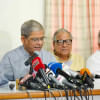
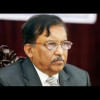
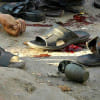
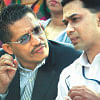
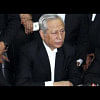


Comments